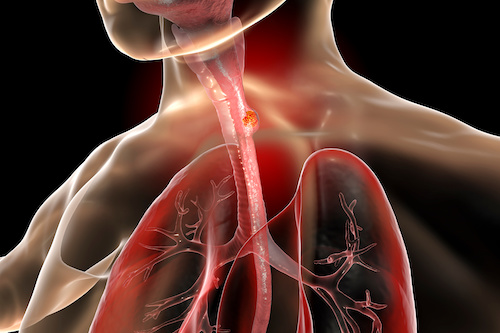What to Know About Esophageal Cancer Awareness Month

Every year, April marks Esophageal Cancer Awareness Month, a time dedicated to raising awareness about this often-overlooked form of cancer. Esophageal cancer is a disease that affects the esophagus, a crucial part of our digestive system responsible for transporting food and liquids from the mouth to the stomach. This month, our providers at Wake Endoscopy Center are dedicated to spreading knowledge about esophageal cancer, its risk factors, symptoms, diagnosis, and the importance of early detection.
The Prevalence of Esophageal Cancer Awareness Month
Esophageal cancer is a relatively rare form of cancer but poses significant challenges due to its aggressive nature. According to the American Cancer Society, it is estimated that in 2023, about 19,260 new cases of esophageal cancer will be diagnosed in the United States alone, with approximately 15,530 deaths expected. Esophageal cancer typically occurs more frequently in men than in women, and the risk of developing it increases with age.
Types of Esophageal Cancer
There are two primary types of esophageal cancer:
Esophageal Squamous Cell Carcinoma (ESCC): This type typically originates in the flat cells lining the esophagus and is often linked to tobacco and alcohol use. ESCC was more common in the past but has become less prevalent in recent years.
Esophageal Adenocarcinoma (EAC): EAC develops in the glandular cells of the lower esophagus, and its risk factors include obesity, chronic acid reflux (gastroesophageal reflux disease or GERD), and Barrett’s esophagus, a condition in which the lining of the esophagus changes due to acid exposure.
Causes and Risk Factors
- Gastroesophageal Reflux Disease (GERD): Chronic acid reflux or GERD is a leading risk factor for esophageal cancer. When stomach acid flows back into the esophagus over a long period, it can lead to changes in the esophageal lining, potentially increasing the risk of cancer development.
- Tobacco and Alcohol: Smoking and excessive alcohol consumption are well-known risk factors for various types of cancer, including esophageal cancer. Combining these two habits greatly amplifies the risk.
- Obesity: Obesity is associated with an increased likelihood of developing esophageal cancer, particularly adenocarcinoma. It is believed that the excess fat tissue may contribute to chronic inflammation and hormonal changes, fostering cancer growth.
- Diet and Nutrition: A diet low in fruits and vegetables and high in processed meats and other unhealthy foods may also increase the risk of esophageal cancer. Consuming a balanced, nutritious diet can help reduce this risk.
Recognizing the Symptoms:
Esophageal cancer often goes undetected until it reaches an advanced stage. Recognizing its symptoms is crucial for early diagnosis and better treatment outcomes. Common symptoms include:
- Difficulty Swallowing (Dysphagia): As the tumor grows, it can obstruct the passage of food through the esophagus, causing difficulty in swallowing. This is often the first noticeable symptom.
- Unintended Weight Loss: Esophageal cancer can reduce appetite, making it challenging to maintain a healthy weight. Unexplained weight loss can be a warning sign.
- Chest Pain: Some individuals may experience chest pain or discomfort, often described as a burning sensation behind the breastbone.
- Chronic Heartburn or Indigestion: While occasional heartburn is common, chronic or severe heartburn may be a symptom of esophageal cancer, especially in the context of other risk factors.
Prevention and Awareness:
Esophageal cancer can often be prevented or diagnosed at an earlier, more treatable stage. Here are some preventive measures and steps to increase awareness:
- Lifestyle Choices: Quit smoking, limit alcohol consumption, and maintain a healthy weight to reduce your risk.
- Dietary Changes: Consume a diet rich in fruits, vegetables, and whole grains while avoiding processed and red meats.
- Manage GERD: If you have acid reflux, seek medical advice to manage symptoms and reduce the risk of developing Barrett’s esophagus.
- Regular Check-Ups: Regular medical check-ups can help detect any symptoms or risk factors early on.
- Raise Awareness: Participate in Esophageal Cancer Awareness Month by sharing information with your friends and family, supporting advocacy groups, or organizing local awareness events.
Contact a Gastroenterologist
In conclusion, Esophageal Cancer Awareness Month serves as a reminder of the importance of knowledge, prevention, and early detection. If you want to speak more about the risk factors, symptoms, and treatment options for esophageal cancer, consult one of our Wake Endoscopy Center providers.
Back